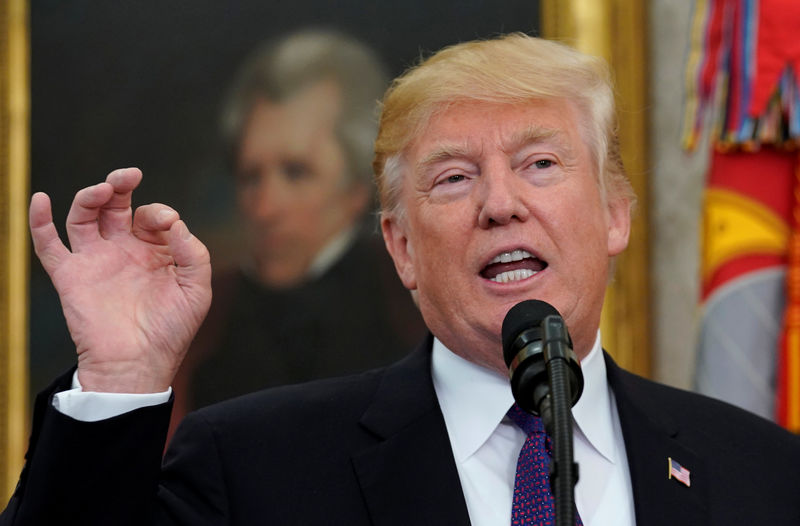By David Morgan
WASHINGTON (Reuters) - President Donald Trump's weekend remark about a scaled-back tax cut for corporations sparked behind-the-scenes debate in the U.S. Congress, with a White House aide trying on Thursday to minimize the impact of the president's comment.
Two rival tax bills, passed separately by the Senate and the House of Representatives, propose cutting the U.S. corporate tax rate to 20 percent, but they differ in other areas that Republicans are trying to merge into final legislation.
Speaking to reporters after the Senate approved its tax bill on Saturday, Trump said the corporate tax rate in the final legislation, expected soon from lawmakers, "could be 22 (percent) ... it could also be 20 (percent)."
The remark whetted the interest of some Republicans who see a slight upward bump in the proposed corporate tax rate as capturing needed federal revenue that would help solve other problems with the legislation, according to lobbyists.
"The 20 percent rate ought to be our goal," said House Ways and Means Committee Chairman Kevin Brady, who is expected to head a bicameral House-Senate negotiating committee.
"My view is the president is giving us flexibility in that area if it's needed. No decision's been made on if that's needed," the Texas Republican told reporters.
But White House legislative affairs director Marc Short told Reuters on Thursday that Trump was not voicing support for a higher proposed corporate rate. Instead, he may have been only expressing views conveyed to him by Republican senators.
"I think he was just reflecting what conversations he had heard from them, but that ... wasn't intended to signal: this is an endorsement of raising the corporate rate," Short said.
"We believe that 20 percent is the right number ... 20 percent is about as high as we feel comfortable going," he said in an interview.
Trump and his Republican allies have plenty riding on what happens over the next few weeks.
A sweeping U.S. tax overhaul, which has not been achieved since 1986, would give Republicans their first major legislative victory of 2017, after their failure to overturn former President Barack Obama's healthcare law. Without a win, Republicans fear they could lose their control of the House and Senate in the 2018 congressional elections.
But it may be too late to avoid confusion over priorities as the tax debate moves forward in Congress.
Lobbyists said many perceive that Trump and his advisers would accept a corporate rate higher than 20 percent.
White House economic adviser Kevin Hassett said on Thursday that a 22 percent corporate rate would not undermine the economic boost that Republicans say tax cuts will create.
Analysts say the corporate income tax rate could be a ready source of revenue for lawmakers, as they move toward a final bill that can lose no more than $1.5 trillion in revenue over the next decade under Senate rules.
Republicans are considering a more costly deduction for state and local taxes than the $10,000 property tax deduction contained in the House and Senate bills. One version would allow taxpayers to choose a $10,000 deduction for either property or income taxes.
House lawmakers also want to adopt the House bill's repeal of the corporate alternative minimum tax, which would cost about $40 billion in revenue over a decade, according to the Joint Committee on Taxation. Senate retained the tax.
A House limit on the amount of debt interest payments that businesses can deduct from their income would also cost about $136 billion more than the Senate version, the JCT said.

Analysts say a one percentage point change in the corporate rate equals about $100 billion in revenues over a decade.